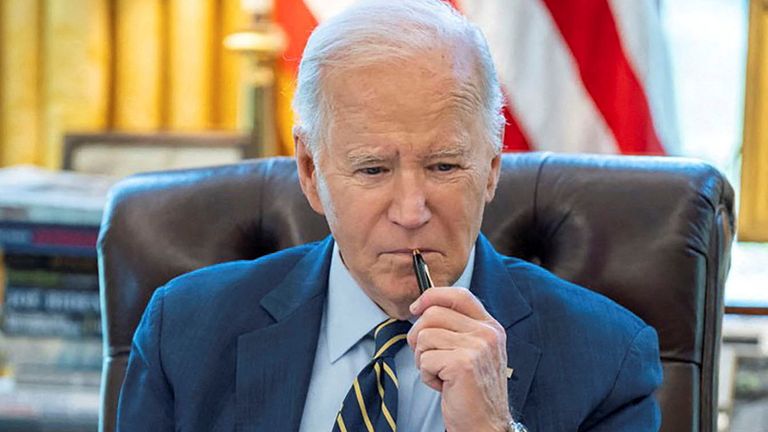On the face of it, the March inflation figures are good news.
The headline Consumer Prices Index (CPI) measure fell from 3.4% in February to 3.2% and the ‘core’ measure, which strips out volatile elements such as energy, food, alcohol and tobacco, eased from 4.5% in February to 4.2%.
However, both figures are higher than expected, with the market having looked for CPI of 3.1% in March and core inflation of 4.2%. To that extent, the figures are a disappointment.
It is, though, the third consecutive month during which CPI has fallen and the good news is that there is almost certain to be a fourth decline when the numbers for the current month, April, are published.
That is because the cap on household energy bills imposed by the energy regulator, Ofgem, fell at the start of the month and that, all things being equal, should bear down on inflation further.
That caveat is important because there is still inflation in the system.
On the eve of Iran’s weekend attack on Israel, the oil price had risen by 17% since the beginning of the year, with Brent crude last Friday hitting $92.18 at one point – a level not seen since 23 October last year.
That is already feeding through to the headline rate of inflation: the Office for National Statistics noted today that the largest upward contribution to March CPI came from motor fuels – the price of which fell in March last year but which rose in March this year.
In time, this uptick in oil prices will feed into all kinds of other prices in the inflation basket, including food, drink and other manufactured goods.
This effect can also be observed in other parts of the world.
The March CPI figure in the United States came in at 3.5% – up from 3.2% in February and the third consecutive month that inflation had come in ahead of expectations. The American experience is a reminder, should one be needed, that inflation does not come down in a straight line.
The other recent lesson from the US is that inflation is proving stickier than expected – something that the Bank of England governor Andrew Bailey and his colleagues on the monetary policy committee know only too well.
At the beginning of the year, the market was expecting five, maybe even six, interest rate cuts from the US Federal Reserve. Now it is expecting two at best. American consumers have money in their pockets and, judging from the unexpectedly strong retail sales figures published on Monday, they are spending it.
Accordingly, Jay Powell, the Fed’s chair, has been busily talking down Wall Street’s expectations of rate cuts, telling a meeting at the IMF and World Bank’s spring meeting in Washington on Tuesday that interest rate cuts this year might not be forthcoming unless the economy shows signs of slowing down.
Mr Powell and his colleagues had previously indicated that they were seeking more confidence that inflation was approaching its target rate.
But he said on Tuesday: “The recent data have clearly not given us greater confidence and instead indicate that it is likely to take longer than expected to achieve that confidence.”
Complicating matters for the Fed is that this is an election year. The Fed has cut interest rates in election years in the past – it did so in 2020 in response to the pandemic and in 2008 in response to the global financial crisis – but the last time it did so outside of those exceptional circumstances was back in 1992 when it pressed ahead with the last of a series of rate cuts which it had launched in response to the recession of 1990 and 1991.
None of this makes life easier for Mr Bailey and his colleagues.
Tuesday’s jobs data for March provided a good example of the dilemma faced by the Bank: on the one hand there was evidence of a softening labour market, with the headline rate of unemployment creeping up from 3.9% to 4.2%, but on the other, regular wages rose by 6% during the month, which is significantly stronger than the MPC would want to see before cutting UK interest rates.
The MPC will also watching carefully to see that the recent strength in US inflation does not feed into higher prices of goods imported from the United States to the UK.
For now, though, the language being used by Mr Bailey is in contrast with that of his US counterpart. He told the IMF on Tuesday that there was evidence that the UK was “disinflating”. The financial markets are now coming round to the view that the Bank of England may now cut interest rates before the Fed – with the European Central Bank moving before either of them.
As for the UK government, which also faces an election this year, it has to hope that inflation does keep coming down and that consumers will start to feel better about life.
Chancellor Jeremy Hunt’s two cuts in national insurance for working Britons since the start of the year should also, in theory, put more money in the pockets of millions of consumers.
Weighed against that is the fact that some households are yet to feel the full impact of the Bank’s interest rate rises between December 2021 and August last year.
The Bank’s most recent Financial Stability Report, published just before Christmas, noted that some five million UK households who locked into their mortgage deals before it began raising the cost of borrowing would feel the impact of higher mortgage costs between then and the start of 2026.
The fact that the Bank has not raised interest rates since August last year may have led some people to forget that rather inconvenient fact.
It’s doubtful that Rishi Sunak and Jeremy Hunt have, though.



